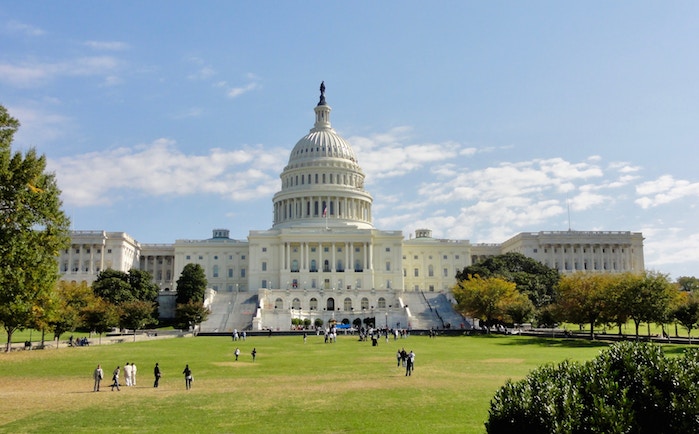The country’s leaders in Washington D.C. are once again at odds over the future of cannabis.
As shown by two conflicting developments from the capital this month, the federal government remains unsure of how exactly its wants to legislate marijuana. This makes the future both bright and frightening for legal pot.
Sessions Targets Medicinal Marijuana
Attorney General Jeff Sessions, infamous anti-cannabis crusader, almost got his wish for the unhindered right to interfere with state-approved medicinal marijuana.
Earlier this month, the Republican-led U.S. House Committee on Rules blocked several cannabis-related amendments from the federal appropriations bill (AKA the U.S. budget). Among these measures was the Rohrabacher-Blumenauer amendment.
Introduced in 2003 and passed in 2014, this legislation bars the Justice Department from spending funds to interfere with state medicinal marijuana programs. These protections were set to expire after Sept. 30. If they disappeared, Sessions would have nothing stopping him from cracking down on medicinal pot for its violation of the Controlled Substances Act.
This situation obviously bodes poorly for medicinal professionals. Regardless of operating legally under state law, they could face penalties from the federal government. And few would be surprised if Sessions jumped at the chance to disrupt medicinal marijuana.
He will have to wait a bit longer, however. When President Trump worked with Democrats to fund the government through Dec. 8, the deal included a rider extending the Rohrabacher-Blumenauer amendment. That’s a two-month reprieve for medicinal markets.
Whether the supporters of cannabis and state rights can muster a defense in the meantime of Rohrabacher-Blumenauer remains to be seen. Its creators — Congressmen Earl Blumenauer (D-OR) and Dana Rohrabacher (R-CA) — hold out hope for the future.
“These critical protections are supported by a majority of our colleagues on both sides of the aisle,” they wrote in a jointly released statement after the move to block their legislation. “There’s no question: If a vote were allowed, our amendment would pass on the House floor, as it has several times before.
Our fight to protect medical marijuana patients is far from over. The marijuana reform movement is large and growing . . . This setback, however, is not the final word. As House and Senate leadership negotiate a long-term funding bill, we will fight to maintain current protections.”
Feds Want Cannabis Research
At the same time that Sessions sought to undercut medicinal cannabis, other elements of the federal government want to study it.
The powerful U.S. Senate Appropriations Committee released a report last week that called for funding of a “National Testing Program for Schedule I Marijuana-Derived Products.” The report wants the National Institute on Drug Abuse (NIDA) to collaborate with the Drug Enforcement Administration (DEA) on analyzing different forms of cannabis to “provide robust reliable data that can inform policy.”
This is, of course, a far cry from Sessions trying to use federal funds in the crackdown of medicinal marijuana.
The NIDA had run a program until 2014 that studied illegal marijuana confiscated by law officers. The institute has never analyzed legal cannabis products. The report argued that research on these products would be “essential for informing substance abuse prevention efforts, public health policy, and law enforcement tactics across the Federal Government.”
If those words sound ominous, another section of the report should soothe worried ears. Lamenting roadblocks of this research, senators wrote that their “Committee is concerned that restrictions associated with Schedule 1 of the Controlled Substance Act effectively limit the amount and type of research that can be conducted on certain schedule 1 drugs, especially marijuana or its component chemicals and certain synthetic drugs.
At a time when we need as much information as possible about these drugs, we need to review lowering regulatory and other barriers to conducting this research. The Committee directs NIDA to provide an update . . . on the barriers to research that result from the classification of drugs and compounds as Schedule 1 substances.”
Many of the issues and misunderstandings surrounding marijuana stem from a lack of research on the subject. Cannabis studies are difficult because of its federally illegal status. Should senators behind the report get their way, it could lead to highly productive analysis on cannabis that could help propagate a publicly safe, legitimized legal market.
Kyle Swartz is editor of Cannabis Regulator. Reach him at kswartz@epgmediallc.com. Read his recent piece: The Answer to Cannabis DUIs is . . . Common Sense?










